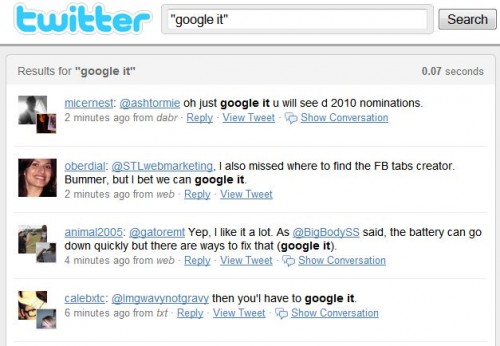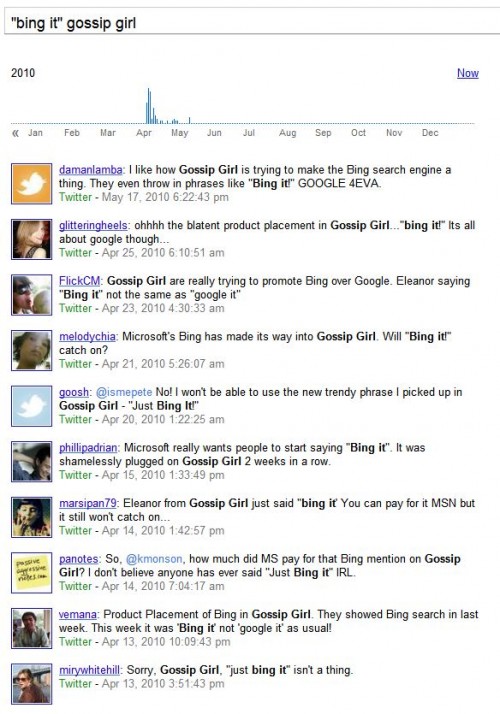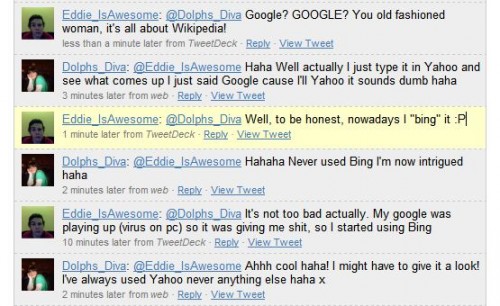Yes, People Do Say “Bing It” — Barely
It was around 2001 when I first really noticed the transition from people talking about “searching” for something to “Googling” information. As Google’s brand grew, it also became a synonym for search engines in general. That’s something Bing, coming up on its first birthday, has hoped to challenge. Good news. Yes, people are saying “Bing […]
It was around 2001 when I first really noticed the transition from people talking about “searching” for something to “Googling” information. As Google’s brand grew, it also became a synonym for search engines in general. That’s something Bing, coming up on its first birthday, has hoped to challenge. Good news. Yes, people are saying “Bing It.” That’s a huge accomplishment. Bad news: many, many more continue to say “Google It.”
Binging It On Twitter
I came across people saying “Bing It” on Twitter recently. It’s easy to find real-life examples. Here are are some from the past few days, from a search on Bing It:
JustLakey: Someone said Bing it!!! Take that Google!
BrowniesNCream: Some qns shouldn’t be asked on twitter! Google it, bing it even ask jeeves! But don’t ask twitter
ahmed2250: we say “I googled that” or “google it” , hopefully more ppl start using bing so I can say “I binged that” & “bing it”
shwaldman @Tara_Costa – They do! You can find seat belts all over the place. They are harnesses that strap into the car seat belt. Bing It. Google It.
treefroggirl @StuartYoung you know how to use a search engine… Bing it!
More Still Googling It
Of course, many more people say “Google It” Here’s a search from Twitter on that phrase:
The first four tweets, all less than 10 minutes old, have references to people saying “Google It.” In the course of an hour, there were roughly about 80 uses of the phrase. In contrast, someone says “Bing It” maybe once or twice per hour, if even that much.
Still, Bing deserves some credit. Even if only a few people are saying to “Bing It,” that’s a big achievement from what many, including myself, would have believed possible a year ago.
Gossip Girl & Bing
How’s it happening? In part, some product placement is probably helping. One recent example is Bing’s deal with Gossip Girl that has characters making references to Bing. That’s getting the phrase out, even if some viewers aren’t buying it:
Those are tweets over time, found using Google’s Twitter Archive Search, that mention “bing it” and Gossip Girl. Some of my favorites from that search (or by looking for “Bing It” with the hashtag #gossipgirl or the account name @gossipgirl) include:
damanlamba: I like how Gossip Girl is trying to make the Bing search engine a thing. They even throw in phrases like “Bing it!” GOOGLE 4EVA.
YESDemi What’s with all this Bing? It’s like #gossipgirl doesn’t believe in google.
luciebartlett Oh god, someone just said ‘Bing it’ in @gossipgirl. As in Google it. Except no one says Bing it. Apart from in gratuitous product placement.
I’m Too Old Fashioned To “Bing It”
There are also some who just don’t seem to like the phrase “Bing it” for various reasons:
kateedwards34 I hate BING. I don’t want to BING it. I like google. I want to google it. If that makes me old then so be it.
ahmed2250 Yeah but bing it sounds dirty, “I binged it last night” “OMG u did what?” “binged it” “WOW how would one go about doing that” @MrMoNous see
jmroskell Sorry Microsoft. It just sounds *wrong*. Id far rather “Google” something than “Bing” it.
C’mon, Try It!
Still, there were also some interesting conversations I found where Bing supporters on Twitter where trying to get friends to try it. For instance:
There someone jokes with a friend that “nowadays I ‘bing’ it.” The friend remarks about being “intrigued” and as the conversation continues, says he might try it instead of Yahoo.
(See, I told you Bing was stealing people from Yahoo! — When Losers Are Winners: How Google Can “Lose” Search Share & Yet Still Stomp Yahoo).
Here’s another conversation:
In this one, someone tells her friend to “Bing it!” To her friend’s disbelief, she explains further that she tried Bing for a week and liked it — getting her friend to say she’ll give Bing a try.
(FYI, one of the two parties in that conversation has protected their tweets, but they’re viewable through search on both Twitter Search and Google. This is probably due to her having recently changed her settings. Tweets made before shifting to protected status remain public).
Gotchas
A couple of last points, for those who may want to do their own searches of people saying “Bing it” or “Google it” in Twitter.
One issue is that there are plenty of examples I found where people said “bing it” when they meant to tell someone to “bring it.” That will skew things for anyone who tries to reference count.
Google’s Twitter Archive maddeningly also considers the word “it’s” to be the same as “it.” Look here:
In that case, I did a search for +”google it” — which is supposed to cause Google to return only content that has the exact phrase “google it” within that content. Instead, I got matches for things like:
- #google, it
- [Google]: It’s
- Google — it
- Google! It’s
Punctuation isn’t being counted, which I can understand, even if it is annoying. But matching “it” to be “it’s” makes no sense.
When Did “Google It” First Emerge?
Finally, when did people first start talking about how they were going to “Google It?” That’s really tough. Using Google News Archive Search, I tried to find the earliest news article with a mention. Unfortunately, some of the same punctuation issues mentioned above also produced some false positives — among other issues. But by the mid-2000s, there are plenty of solid references.
My favorite article remains Don’t Be Shy, Ladies-Google Him! Check Out His Search Engine First from January 14, 2001. That was an article from the New York Observer on “Googling” men before a date. It’s the first time I recall Google being used by the mainstream media in such a generic manner.
Perhaps someday, enough people will have used Bing to talk about “Binging” people. Bing still has a long, long way to go — but at least it has moved onto the radar screen of popular culture.
Contributing authors are invited to create content for Search Engine Land and are chosen for their expertise and contribution to the search community. Our contributors work under the oversight of the editorial staff and contributions are checked for quality and relevance to our readers. The opinions they express are their own.
Related stories
New on Search Engine Land




